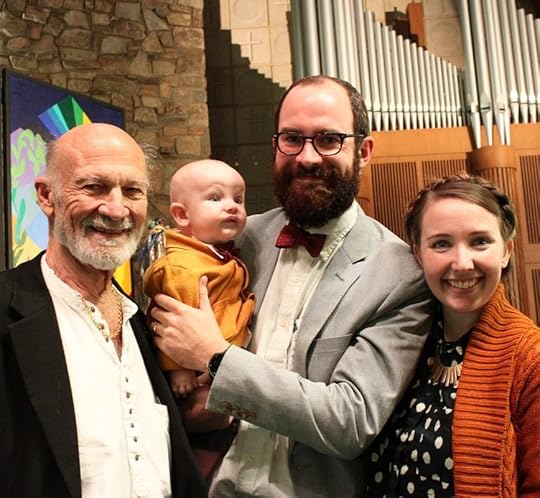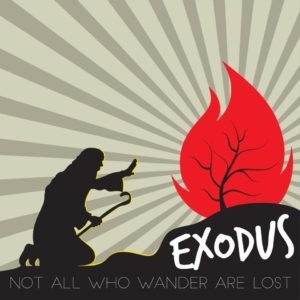Jason Micheli's Blog, page 131
October 31, 2017
Getting Off the Treadmill of the Law: Hauerwas is Wrong about the Reformation
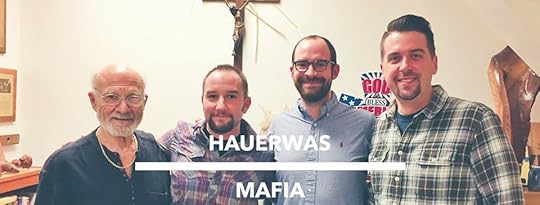 My friend and muse Stanley Hauerwas wrote an editorial in the Washington Post to observe this Reformation Day coinciding with the 500th Anniversary of Martin Luther nailing his 95 theses to the Wittenberg door. Luther had hoped to provoke a debate with his theological brothers and monastic colleagues. He ignited a powder keg that became a revolution.
My friend and muse Stanley Hauerwas wrote an editorial in the Washington Post to observe this Reformation Day coinciding with the 500th Anniversary of Martin Luther nailing his 95 theses to the Wittenberg door. Luther had hoped to provoke a debate with his theological brothers and monastic colleagues. He ignited a powder keg that became a revolution.
Assessing the religious landscape, where innumerable varieties of Protestant Christianity must compete against each other in an increasingly secular culture, Stanley, with a tone of self-loathing, asks why we holdouts from the Mother Church don’t simply return to the Catholic Church. After all, he contends, the issues which prompted Luther’s critique 500 years ago have since been resolved by first the Council of Trent and recently Vatican II.
Never mind that (on this All Saints eve) Protestants and Catholics still disagree over the definition and making of a saint or that Rome still practices indulgences, albeit in a far different form, whatever reconciliation Catholics and Protestants have reached on paper in conciliar gatherings it’s simply not the case that on the ground, in congregations, the issues which sparked the Reformation have been resolved. Stanley, as a trainer of preachers, should know this fact and perhaps bear some responsibility for it.
What do I mean?
During his time at Union Seminary, Dietrich Bonhoeffer famously remarked that Protestantism in America had never gone through the Reformation; that is, the dominant ethos of American Christianity was pietism.
Stanley is wrong, I think, about the continuing relevance of the Reformation because Bonhoeffer continues to be correct.
Pietism continues to be the dominant key in which both Evangelicalism and Mainline Protestantism perform the Gospel, preaching the Law without distinction from the Gospel in ways that manifest as either moralism on the one hand or turn-and-burn brimstone, which forgets Christ has already closed the abyss between God and us, on the either.
Neither version of pietism reflects the Reformation’s recovery of the Gospel of justification through faith alone by grace alone in Christ alone.
Against Martin Luther, evangelical pietism in America, in its best forms, posits a continuous self and focuses not on how God works to condemn us as sinners and justify us for Jesus’ sake but instead on faith as a program for greater spiritual self-improvement. This emphasis on spiritual self-improvement is the root that all too often flowers into Christianity as behavior modification. Mainline Protestants, meanwhile, tend to be what Mark Mattes calls “secular evangelicals” who’ve undermined the evangelistic thrust of the Gospel by instead working “to use the Church at the national level to pressure governmental agencies to conform to its particular version of peace and justice.”
Put simply, what most Protestants hear proclaimed week in and week is one of two flavors of pietism.
From Evangelicals it’s Become a Better You.
From Mainline Protestants it’s Build a Better World.
Mainline Protestants hate Joel Osteen, I suspect, because he’s but the inevitable product of a shared theology.
The assumption conveyed in congregations is that, yes, Christ died to cover your sins (if sin language is even used) but now we have a responsibility to play a part in salvation and the moral progress of self and society. This emphasis on our agency and ability to choose God and the good by our nature is called Pelagianism. Not only is it ripe for self-righteousness, it was condemned as a heresy 1500 years ago, a form of it, Semi-Pelagianism, is confused as our kerygma by many Christians.
This is a far cry from the Reformation’s reclamation of the announcement from the Apostle Paul that, apart from any of our religious doing (Law), God has shown us sinners grace in Jesus, given us Christ’s righteousness as our own, and gifted this to us through a faith predicated on his faithfulness alone.
Instead I think what many Protestants experience is what Craig Parton describes:
“My Christian life, truly began by grace, was now being “perfected” on the treadmill of the Law.
My pastors did not end their sermons by demanding I recite the rosary or visit Lourdes in order to unleash God’s power; instead, I was told to yield more, pray more, care about unbelievers more, read the Bible more, get involved with the church more, love my wife and kids more.
Not until…some 20 years later, did I understand that my Christian life had come to center around my life, my obedience, my yielding, my Bible verse memorization, my prayers, my zeal, my witnessing, my sermon application.
I had advanced beyond the need to hear the cross preached to me anymore. Of course, we all knew Jesus had died for our sins, and none of us would ever argue that we were trying to “merit” our salvation. But something had changed. God was a Father all right, but a painfully demanding one. I was supposed to show that I had cleaned up my life and was at least grateful for all the gifts that had been bestowed…
The Gospel was critical for me at the beginning, critical now to share with others, and still critical to me into heaven, but it was of little other value. The ‘good’ in the good news was missing.”
Hauerwas is wrong, I think, because all over America, in red and blue churches alike, Mainline and Evangelical both, we’re exhausting people on the treadmill of the Law, exhausting them with expectations that, by their very nature, grate against the good news of the Gospel that they are justified by grace and reckoned righteous through Christ alone and always.
Phyllis Tickle famously said that every 500 years the Church goes through a Reformation. I wonder if the next great reformation for the Church in America will finally be to embody the message of the first.
Follow @cmsvoteup

October 30, 2017
Don’t Just Do Something, Stand There
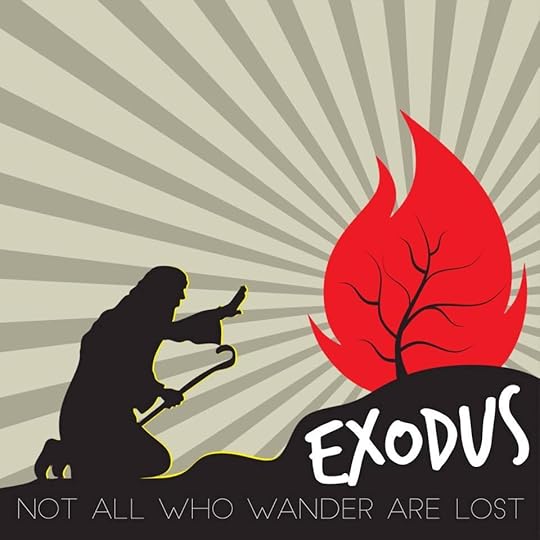 The 500th Anniversary coincided this Sunday with our trek through the Book of Exodus. The text for the day was Exodus 16.
The 500th Anniversary coincided this Sunday with our trek through the Book of Exodus. The text for the day was Exodus 16.
“You’ve brought us out here to kill us!” I grumbled to my wife a couple of weeks ago when I realized what little water she’d packed to hike Joshua Tree National Park.
So I can empathize with the recently-rescued Israelites who lodge the same complaint against God.
Still, it sounds a little ungrateful considering they’re still damp from the Red Sea through which God FREAKING DELIVERED THEM FROM CENTURIES OF SLAVERY. Really?
All it takes is the munchies for their Bob Marley Exodus song to turn Janet Jackson circa 1986: “What have you done for me lately?!”
Ungrateful or not, it’s a fair gripe because they’re not lost. No one took a wrong turn into the desert. It’s not Siri’s fault.
From the Red Sea forward, God guided them, appearing in a pillar of cloud and fire, straight into godforsaken-ness.
They’re there because God has led them there.
And not only is it a justified complaint, it’s correct.
God has brought them there to kill them.
(You won’t hear that from Joel Osteen! You’re welcome.)
———————-
God has brought them to the desert for the desert to be the death of them, for their hunger to be the hospice through which God kills off their old selves. That they recall their bondage to Pharaoh fondly is proof that they’re not yet free. So God brings them to the desert for a different kind of deliverance. God answers their nostalgia for Egypt’s stewpots by upping the ante and providing quail every evening.
Quail was considered a delicacy and according to Moses every evening at twilight this abundance of expense, quail, covered their camp. Wherever they were in the wilderness, it was there. God responds to their petty, ungrateful griping with a gesture of unmerited extravagance. Even though they begrudge him their deliverance, God gives them the opposite of what they deserve.
Every day a feathered two-part message: 1) Lose your illusions about Egypt and 2) I, the Lord your God, am not a Pharaoh.
“Quail covered the camp” Moses writes. Every evening, fancy 5-Star fare.
And every morning, under the dew of the desert, the opposite of extravagance: manna.
Bread. From Heaven.
Because we put the loaves on the altar table instead of smearing the dough on foreheads at Ash Wednesday, it’s easy for us to forget.
Bread, in the Bible, is not quail. It’s not food for a fancy feast.
Bread, in the Bible, is a token of the Fall.
Bread is a symbol for original sin.
After Adam and Eve distrust God in the Garden and disobey God’s only law, God shows them the exit to Eden and God’s parting words to Adam: “Because you have disobeyed…by the sweat of your brow, you shall eat bread until you die.”
That comes right before the Ash Wednesday warning: “…for you are dust and to dust you shall return.”
Before the Fall, Adam and Eve ate the fruit of the Garden.
After the Fall, bread becomes a kind of sacrament of their estrangement from the Garden.
And it’s work that requires work: harvesting and grinding and mixing and kneading and rising and waiting and folding and rising and waiting and folding and baking. Bread is the work that marks their sin and fall from grace but now, in the Desert of Sin, God gives it to them as grace. Their work- the wages of their sin- becomes grace.
And it’s all God’s work. There’s no harvesting or grinding or mixing or kneading or rising or waiting or folding or rising or waiting or folding or baking. There’s nothing for them to do but receive it. Every morning, what had been their work to perform is God’s grace to provide. Not on any morning is there anything for them to do except trust that wherever they are it will be there and it will be enough.
God takes their work and God makes it grace because God has rescued them from Egypt in order to return them to Eden. God has delivered them from the despot Pharaoh and delivered them into the Desert of Sin in order to undo their original sin.
Our original, originating sin- it wasn’t disobedience. It wasn’t picking the fruit of the tree in the Garden. That would be a stupid story. Our original, originating sin wasn’t disobedience; it was disbelief.
“Did God really say…?”
Our original sin was unbelief, not our failure to obey God’s law but our failure to trust God’s promise, to trust God’s promise that avoiding the tree in the Garden was for our good. And so in the Desert of Sin, every morning God gives them manna according to his promise. The work that had been theirs to do becomes God’s work alone.
The symbol of their unfaithfulness becomes a sign of God’s faithfulness. And God gives it to them as grace.
There’s nothing for them to do but trust God’s doing. Anything other than trust alone in the doing of God and the bread of heaven breeds worms. From dirt you came and to dirt you will return.
Whether they knew or not- the grumblers were absolutely right. God has brought them there to kill them, to exterminate the old, untrusting Adam in them. God has gotten them out of Egypt and now, in the Desert of Sin, God is getting the Egypt out of them.
Because it’s slaves who ask “What must I do?”
It’s slaves who ask “What do I have to do now? What should I being doing, Lord?”
But it’s children who trust their Father to do everything for them.
It’s slaves who ask “What must I do?”
It’s children who trust their Father’s promise that it is done.
It’s children who trust when they’re told “It is finished.”
They might be cranky with the munchies and ungrateful as all get out, but the Israelites- they’re right. God has led them there to Sin to kill them.
Nude faith-
Faith clothed only in the grace of God, trusting that there’s nothing for us to do but believe and receive, for those of us whose self-image is so determined by what we do, faith alone in the grace of God alone- don’t lie- it isn’t just offensive; it feels like dying.
———————-
BJ Miller is a palliative care doctor at a facility called Zen Hospice in San Francisco. I heard Miller give a TED Talk a couple of years ago, and this winter I read a story about him in the NY Times.
When BJ Miller was a sophomore at Princeton University, one Monday night, he and two friends went out drinking. Late that night, on their way back, drunk and hungry, they headed to WAWA for sandwiches.
There’s a rail junction near the WAWA, connecting the campus to the city’s main train line. A commuter train was parked there that night, idle, tempting BJ Miller and his friends to climb up it.
Miller scaled it first.
When he got to the top, 11,000 volts shot out of a piece of equipment and into Miller’s watch on his left arm and down his legs. When his friends got to him, smoke was rising from his shoes.
BJ Miller woke up several days later in the burn unit at St. Barnabas Hospital to discover it wasn’t a terrible dream. More terribly, he found that his arm and his legs had been amputated.
Turmoil and anguish naturally followed those first hazy days but eventually Miller returned to Princeton where he ended up majoring in art history.
The broken arms and ears and noses of ancient sculptures helped him affirm his own broken body as beautiful.
From Princeton, Miller went to medical school where he felt drawn to palliative care because, as he says, “Parts of me died early on. And that’s something, one way or another, we can all say. I got to redesign my life around my death, and I can tell you it has been a liberation. I wanted to help people realize the shock of beauty or meaning in the life that proceeds one kind of death and precedes another.”
After medical school, Miller found his way to Zen Hospice in California where their goal is to de-pathologize death; that is, to recover death as a human experience and not a medical one.
They impose neither medicine nor meaning onto the dying. Rather, as Miller puts it, they let their patients “play themselves out.” Whomever they’ve been in life is who they’re encouraged to be in their dying.
For example, the NY Times story documents how Miller helped a young man named Sloan, who was dying quickly of cancer, die doing what he loved to do: drink Bud Light and play video games.
Talking about Sloan’s mundane manner of dying, Miller said this- this is what got my attention:
“The mission of Zen Hospice is about wresting death from the one-size- fits-all approach of hospitals, but it’s also about puncturing a competing impulse: our need for death to be a transcendent experience.
Most people aren’t having these profound [super-spiritual] transformative moments (in their lives or in their deaths) and if you hold that out as an expectation, they’re just going to feel like they’re failing.”
Most people aren’t having these profound [super-spiritual] transformative moments (in their lives or in their deaths) and if you hold that out as an expectation, they’re just going to feel like they’re failing.
They’re going to feel like there is something they must be doing that they’re not doing. They’re going to worry that they’re doing something wrong or they’re going to fear that they’re not doing enough.
———————-
In the Gospel according to John, no sooner has Jesus fed a hungry crowd of 5,000 with only 5 loaves of bread and 2 fish than some grumblers in the mob start to measure this Messiah’s manna-hood.
“5 loaves and 2 fish…that’s a nifty trick, Jesus. Good for you! Now Moses…he was something else. Moses fed all of Israel every morning with manna for 40 years.”
And Jesus replies (in my Southern paraphrase edition): “Bless your heart.”
No, Jesus replies: Moses isn’t the One who gave you manna. I AM the Bread of Life. I AM the Bread of Heaven, Living Bread. Manna is me, come down for you.
And then Jesus shifts metaphors: Whoever eats my flesh and drinks my blood will have eternal life and whoever does not will not.
Those who ate manna in the Desert of Sin, Jesus points out, still died of sin. So Jesus warns them: “Do not work for the food that perishes but for the food that endures for eternal life.”
Do not work for the food that perishes.
And what comes next in the Gospel according to John- it’s only 2 verses, it’s just 30 Greek words, but it’s everything.
It’s the sum of St. Paul’s message. It’s the core of the Protestant Reformation. It’s the reason we’re not worshipping at Good Shepherd Catholic Church this morning.
It’s only 2 verses, just 30 Greek words, but it’s everything.
It’s the Gospel.
First, they ask Jesus a question. They ask Jesus the question, the question that captives like us are always asking: “What must we do?”
“What should we be doing so that we are doing the works of God?”
Should we…and you’ve asked the question enough yourself that you can fill in the blank for them. Should we pray more? Should we study the scriptures more? Should we serve the poor more? Spend less at Christmas?
“What should we be doing so that we are doing the works of God?”
And Jesus answers by correcting the grammar of their question. He changes the subject of their sentence, from us to God: “This is the work of God…”
What we think is our work, our burden and obligation, to get right with God, to be reckoned to the good, to be justified before God-
it’s the work of God.
That’s not a ‘we’ kind of question, Jesus says. It’s a God question. It’s the work of God. Alone.
Jesus doesn’t just change the subject of their sentence. He changes the object of their sentence too. We put the question in the plural: “What should I be doing to be doing the works of God?”
What stuff should we be doing? How much do we have to do?
But Jesus answers in the singular: “This the doing of God that you trust the One sent by God.”
There isn’t any stuff we have to do.
We do not have to do several things, or even one good thing, to be justified before God. There is only 1 thing to do, 1 work: your trust.
Like manna under the desert dew, all you have to do is believe and receive.
Trust.
All you have to do is trust that it’s all already been done. All you have to do is trust what he has done.
Jesus Christ, this manna made flesh, has finished what the Father started in the Desert of Sin. He’s killed off the Old Adam in you, once for all, by drowning him in the baptism of his death and resurrection.
The old untrusting Adam in you has been crucified in him; so that, now, in him, in the New Adam, (present-tense, no conditions or qualifiers) the Gospel promises that you are a New Creation.
Where bread was given to the Old Adam as a sign of sin and punishment, this New Adam, the Living Bread of Heaven, has taken on all your sins and suffered punishment in your place; so that, the curse you deserve becomes the blessing you do not.
Don’t just do something, Jesus all but answers, stand there.
Stand still- all you have to do is believe and receive.
Trust.
Like manna in the morning, there’s nothing left for you to do but eat.
Eat this promise.
Trust.
Trust that you are the pearl of great price that the King has bought by giving away everything. Trust that you are the prodigal child for whom the Father did not wait to come home to him but has sought you out in his only Son.
All you have to do is trust the doing of God.
Trust that God made him to be sin who knew no sin; so that, you might become the righteousness of God. Trust that you who were dead to your trespasses have been made (past perfect tense) alive in Christ. Trust that your slate is wiped clean because your sins have been washed in the blood of the lamb. All you have to do is trust.
Trust that in all the ways and places you’ve been unfaithful, your manna molding, the Bread of Heaven has been faithful. He has done what you could never do.
He alone is righteous and by grace alone God reckons his righteousness to you. He credits your account with Christ, such that there’s nothing left to do but trust that it’s all been done.
Faith alone- that’s all there is for you to do because the righteousness of Christ imputed to you is already and will always be overflowing.
Faith alone is the only work you must do.
And it’s not even your work to do because, notice, Jesus changes the verb of their question: “What should we be doing…?” they ask.
And Jesus responds: “This is the doing of God…”
This is the doing of God that you trust the One sent by God.
It’s God’s work. The one and only work we must do, God does in us: trust.
God works faith into us.
The one work we must do to respond to what God has done in Jesus Christ, God also does in us.
It’s just 2 verses in John’s Gospel: 6.28 and 6.29.
It’s just 30 Greek words in John’s Gospel, but it’s the Gospel:
You are saved by God’s grace alone
By Christ alone
By the blood of the Living Bread of Heaven
Through faith alone.
It’s only 2 verses, 30 words, but it’s enough to puncture what BJ Miller calls the competing impulse within us.
“The dying are still very much alive and we are all dying,” BJ Miller tells the Times writer, “we die the way we live.”
We die the way we live.
He means-
Just as many die thinking that there’s something more spiritual or profound or meaningful they’re supposed to be doing and worry that they aren’t doing it or aren’t doing it right or doing it enough, we live with that same anxiety: “What must we be doing so that we’re doing the works of God?”
We think that Jesus came down from Heaven, cancelled out our debts upon the cross, but now it’s on us to work our way up to God.
The Golden Rule may not justify us before God but we sure think it makes a good ladder up to him.
And we’re forever anxious that we need to climb it.
Or that we even can.
The Book of Exodus says that way of thinking- it breeds worms.
What’s miraculous, BJ Miller contends, more miraculous than empty, contrived spiritual gestures- more miraculous, I’d argue than 5 loaves and 2 fish or manna every morning- is watching what the dying do with their lives once they learn they have the freedom not to do anything.
What’s miraculous is watching what the dying do with their lives once they learn they have the freedom not to do anything.
“My work,” Miller says, “is to unburden them from the crushing weight of unhelpful expectations.”
Today is the 500th Anniversary of the Protestant Reformation–
And it says a whole lot about how far we’ve drifted from it that it takes a triple amputee agnostic working at crunchy Buddhist hospice hospital on the Left Coast to point it out to us, BJ Miller’s work-that’s the work of the Gospel too- to unburden you from the crushing weight of expectations.
The Gospel is that you are saved by God’s grace alone by Christ’s atoning blood alone and that is yours through faith- trust- alone. The Gospel is like palliative medicine for the died in Christ. The Gospel is that you are forgiven and justified and loved exactly as you are…FULL STOP.
The work of the Gospel is to unburden you of the crushing weight of that question: “What must I be doing to be doing the works of God?”
The Gospel unburdens you to ask a different question, a question that leads to something more miraculous and even more beautiful.
This question:
What are you going to do with this faith of yours?
Now you have the freedom not to do anything?
Follow @cmsvoteup

October 25, 2017
(Her)Men*You*Tics: Disciple
 If the Gospel can only be received then what does it mean to go and do? How do we balance the tension between doing the things Jesus did and passively receiving the announcement of what only God can do?
If the Gospel can only be received then what does it mean to go and do? How do we balance the tension between doing the things Jesus did and passively receiving the announcement of what only God can do?
In this latest episode we talk about the meaning of the word Disciple.
Dr. Johanna, Teer, and I discuss in this third episode of the latest offspring of the Crackers and Grape Juice posse, a new series called (her)men*you*tics (which means “interpretation”) with my friend Johanna, who is a Professor of Rhetoric at Pitt.
Each week we’ll be tackling a theological term that you’ve either heard before or you’ve heard it doing its work in worship whether you realized it or not. We’re going alphabetically, 2 words per letter, and we’re doing it all in 25 minutes or less.
Give us a rating and review!!!
Help us reach more people: Give us 4 Stars and a good review there in the iTunes store.
It’ll make it more likely more strangers and pilgrims will happen upon our meager podcast. ‘Like’ our Facebook Page too. You can find it here.
Help support the show!
This ain’t free or easy but it’s cheap to pitch in. Click here to become a patron of the podcasts.
Follow @cmsvoteup

October 22, 2017
The Love Song is Not Law: A Wedding Sermon
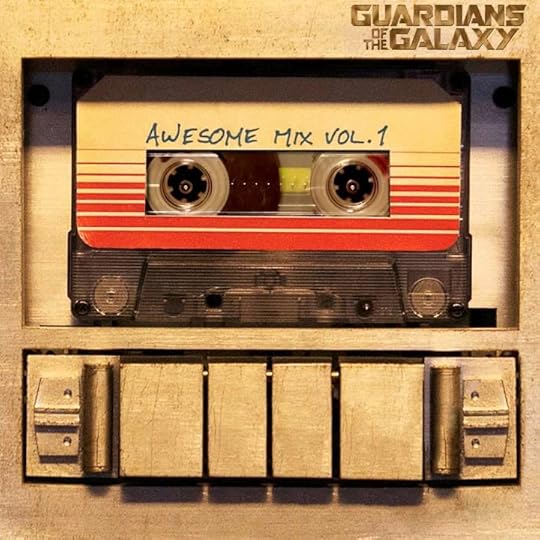 Here’s a wedding sermon I wrote, using (you guessed it) 1 Corinthians 13, for a ceremony I celebrated this weekend in D.C. at the Four Seasons. Steve Martin, Martin Short, and Bill Murray crashed my preaching. I got to chat with Bill but the highlight was getting to preside over the promises made by friends.
Here’s a wedding sermon I wrote, using (you guessed it) 1 Corinthians 13, for a ceremony I celebrated this weekend in D.C. at the Four Seasons. Steve Martin, Martin Short, and Bill Murray crashed my preaching. I got to chat with Bill but the highlight was getting to preside over the promises made by friends.
My experience tells me that wedding sermons are really for the married folk sitting in the chairs not the nervous bride and groom, sweating it out until I get to their parts. In that same spirit, I offer to you all. Married or unmarried, I think there’s some legit good news in this old, hackneyed text for those forever feeling the burden of expectation. And, of course, nothing comes fraught and laden expectations as love.
Here we go:
Since Jess and Austin chose a Kanye song for their wedding, I thought I’d offer a pop song for the sermon: “The Pina Colada Song.” Aside from the pleasures of picturing Steve Larkin yacht-rocking circa 1979 to more liquor than he’ll ingest tonight, that’s a terrible song!
Have you ever paid attention to those lyrics?!
I never did until I took my two boys to see Guardians of the Galaxy and “The Pina Colada” song, from Star Lord’s Awesome Mix Volume I, started to play while Rocket and company escaped from their galactic prison.
“The Pina Colada Song,” it’s original title is “Escape.”
Escape. As in, from Marriage.
“If you like pina coladas and walks in the rain…” Have you listened to this supposed love song?
The man and wife of Rupert Holmes’ 1979 #1 hit sound flip about forsaking everything Jess and Austin are about to promise one another tonight.
Each of them, unsuspecting of the other, takes out a Want Ad, searching for someone who is perfect for them, a companion who likes the feel of the ocean and the taste of champagne.
I guarantee that if Kathy Larkin stumbled across Steve Larkin on Tinder the ensuing dialogue would not be FCC friendly. And I’m pretty sure if Steve ever reacted to having been found out by calling Kathy his “lovely old lady” we’d all be at a parole hearing tonight instead of a wedding.
It’s a song about two imperfect people on the precipice.
And if you pay attention to the lyrics there’s an ironic twist on what we mean by the term ‘soul mate,’ for when the imperfect spouses meet each other through the want ads, what do they do?
They laugh.
They say: “I never knew you liked getting caught in the rain…”
And then they laugh.
Each of them laughs at the imperfect other.
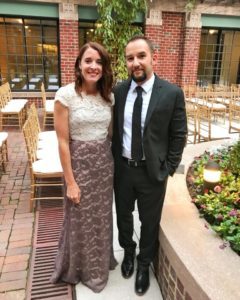 On the one hand, Rupert Holmes’ “Escape” is an awful love song, a ballad about betrayal narrowly averted.
On the one hand, Rupert Holmes’ “Escape” is an awful love song, a ballad about betrayal narrowly averted.
But on the other hand, Rupert Holmes’ hit single- maybe it’s a better marriage song than love song. After all, “Escape” is a pop song about being found out and being known in weakness is the very essence of marriage.
Like Jesus on the cross, the crucible of marriage strips you of all your defenses and disguises so that all your imperfections and insecurities are laid bare for the other to see.
Marriage is a risk that requires vows precisely because marriage makes you vulnerable.
Not only is being known in our weakness the essence of marriage, it just so happens to be the experience that sinners (i.e., humans) most loath. Like Adam and Eve hiding in shame, we spend most of our lives hoping to avoid being found out as the frauds we all are. Adam and Eve covered their shame with fig leaves. We do it by filtering our lives through a social media sheen, or by saying “I’m okay.”
The passion- as in, the suffering- of intimacy isn’t that I get to know someone as they really, truly are; it’s that I am known by someone as I really am. Marriage, therefore, holds a mirror up to you and reveals to you the stranger that you call you.
And one of the things marriage constantly reflects back to us is how far we fall short of the sort of love Paul commends in 1 Corinthians 13.
——————-
No doubt we’d all like a partner who is patient and kind and slow to anger and humble- I know my wife likes having such a partner.
But, if you think Paul’s love song is saying that you should be patient and kind, you should never be boastful or arrogant or rude, then it’s just a matter of time before what’s advice to you becomes an expectation on your spouse.
Your partner should be patient with you. Your partner should be kind to you.
As St. Paul says elsewhere, expectation always elicits the opposite of its intent. Thou shalt provokes I shalt not.
And so, in short order, your expectation produces resentment in your partner because love that is always patient and always kind is an impossible obligation to meet.
And it produces frustration in you.
You soon wonder why sometimes she’s quick to anger or envy.
You wonder why she’s not always patient like she should be; until, you start to see only what she is not and you stop seeing her altogether, such that you don’t even know whether she likes getting caught in the rain or the taste of champagne.
That way of listening to Paul’s love song (your love should be patient, you ought to be un-envious) is to hear it according to what Paul calls the Law.
The Law is shorthand for an accusing standard of performance.
In the Bible, the Law is all those thou shalt and shalt nots. Be perfect as God is perfect, Jesus says. That’s the Law.
And the Law, Paul says, is inscribed in every human heart (Romans 2.15).
So even if you don’t believe in God or follow Jesus or read the Bible, the capital-L Law manifests itself in all the little-l laws in your life, all the shoulds and musts and oughts you hear constantly in the back of your mind, all those expectations and demands and obligations you feel bearing down on you from our culture.
There’s the Law of Social Media where you must crop out all your unhappiness and imperfection.
There’s the Law of Beauty where you’re measured against the standard of an ever-shrinking waist line you must attain.
There’s the Law of Parenting where your kids bento-boxed lunches should contain gluten-free, free-range, organic crustless goodness or you may as well be a slumlord in a Dickens novel.
There’s the Law of Weddings which we’re all obeying tonight.
And there’s the Law of Marriage-
The Law of Marriage which tells you that you and your partner ought to pretend your life is like the picture that comes with the frame, perfect, unabated bliss, and if you’re not happy all the time, there must be something wrong with the two of you.
Martin Luther said that the Law always accuses; that is, it points out our shortcomings.
And when we hear Paul’s love song according to the Law that’s just what it does.
When we hear 1 Corinthians 13 as advice or suggestions or, worse, commands, it just accuses us for how impatient and unkind and rude and conceited and quick to anger we know ourselves to be a whole lot of the time.
But Paul’s love song isn’t meant to be Law; it’s meant to be the opposite of the Law. It’s meant to be Gospel.
It’s the Law that says “Be loving.”
But it’s the Gospel that says “You are loved.”
And Paul’s song is the Gospel not the Law because the love Paul speaks of in 1 Corinthians 13 isn’t Jess’ love and Austin’s love. It’s Christ’s love.
‘Faith, hope and love abide, but love never ends…’
For Paul, only Jesus, who was before creation and who was raised from the dead, is without beginning and end. He’s talking about Jesus.
“Jesus is patient, Jesus is kind, Jesus is not envious or boastful or arrogant or rude.
Jesus does not insist on his own way.”
This love song…he’s talking about Jesus.
Jesus bore all things, bearing in his body our shame.
Jesus believed all things. He did what we could not do, though forsaken he never lost faith.
Jesus endured all things, in our place, while we were yet his enemies.
The love Paul sings about in 1 Corinthians 13 is the love of Jesus, the love whose arms were stretched upon a cross so that your hearts, whether you believe in him or not, might be crucified by love.
This love song isn’t the Law.
It’s the Gospel because it’s not commanding you to love this way.
It’s announcing to you that you have been loved this way.
You have been loved with a love that is patient and kind and slow to anger. This prior love of God- it makes the present-tense love between partners possible. This prior love of God, made perfect in Jesus Christ- it makes the imperfect love of husbands and wives permissible. The Gospel makes the imperfect love of marriage not only permissible but a kind of sacrament, a sign pointing to the perfect, prior love of God.
The Gospel frees you from the Law.
It frees you from all those shoulds, musts, and oughts that pop into your head. It frees you from adhering to anyone else’s standards for what your marriage must be. Because of the Gospel, you’re free to be patient and kind with one another, and you’re free to give grace when you’re neither patient nor kind. You’re free for your marriage to be nothing more and nothing less than who you are and what, together, you become. You’re free, in other words, to be ordinary because the most extraordinary thing about you has nothing to do with you.
Which means, the Gospel frees you from fear.
In marriage, you can be known in your weakness, unafraid, because the Gospel tells you that God knows the very worst about you and God loves you anyway and God has already forgiven you.
Which means, this love song, the Gospel, it frees you to forgive.
It makes it easier for you to forgive your spouse.
Because when you know the person you’re PO’d at has already been forgiven by God unconditionally, it feels more than a little stingy to keep holding your ledger in the red.
 As unlikely as it sounds, I think Rupert Holmes’ “Pina Colada” single is a wonderful song to marriage.
As unlikely as it sounds, I think Rupert Holmes’ “Pina Colada” single is a wonderful song to marriage.
Because, after all, the rings Jess and Austin exchange tonight, what are they if not outward, visible signs of what no one else can see:
How flawed and imperfect we all are
And yet how God in Christ has answered the Want Ad posted in our souls
Has met us in our loneliness
Has found us out in our deepest failures
And by the happy joke we call Cross and Resurrection, laughed.
The rings-
They’re signs of the Gospel promise that Jess and Austin are imperfect people who are free to laugh with each other over those imperfections knowing that every mistake they make has already been mended by the crucified love of God.
And knowing that- it leads not to happiness but to joy. Amen.
Follow @cmsvoteup

October 20, 2017
Episode #119 – Ruben Rosario Rodriguez: Witness Includes the Possibility of Martyrdom
 Here’s the second part to our conversation with Dr. Ruben Rosario Rodriguez.
Here’s the second part to our conversation with Dr. Ruben Rosario Rodriguez.
Back in the day, Ruben taught me Barth for the first time. Now, we’re both black sheep, closet Reformation guys in Catholic and Wesleyan folds respectively. Ruben Rosario Rodriguez is professor of theology at St. Louis University and is the author of the powerful new book Christian Martyrdom and Political Violence.
In this installment, Ruben talks particularly about racism in both the academy and in the student body.
Help us reach more people: Give us 4 Stars and a good review there in the iTunes store.
It’ll make it more likely more strangers and pilgrims will happen upon our meager podcast. ‘Like’ our Facebook Page too. You can find it here.
Help support the show!
This ain’t free or easy but it’s cheap to pitch in. Click here to become a patron of the podcasts.
Follow @cmsvoteup

October 19, 2017
(her)men*you*tics: Doxa
 If doxa in ancient world referred to things commonly held, i.e. public, natural knowledge, then how did the Christians steal it and make it a referent for that most peculiar and particular of faith claims, namely that God is Three in One?
If doxa in ancient world referred to things commonly held, i.e. public, natural knowledge, then how did the Christians steal it and make it a referent for that most peculiar and particular of faith claims, namely that God is Three in One?
Dr. Johanna, Teer, and I discuss in this third episode of the latest offspring of the Crackers and Grape Juice posse, a new series called (her)men*you*tics (which means “interpretation”) with my friend Johanna, who is a Professor of Rhetoric at Pitt.
Each week we’ll be tackling a theological term that you’ve either heard before or you’ve heard it doing its work in worship whether you realized it or not. We’re going alphabetically, 2 words per letter, and we’re doing it all in 25 minutes or less.
Give us a rating and review!!!
Help us reach more people: Give us 4 Stars and a good review there in the iTunes store.
It’ll make it more likely more strangers and pilgrims will happen upon our meager podcast. ‘Like’ our Facebook Page too. You can find it here.
Help support the show!
This ain’t free or easy but it’s cheap to pitch in. Click here to become a patron of the podcasts.
Follow @cmsvoteup

October 18, 2017
Letter to My Godson
Happy Birthday Elijah!
Don’t let your mother read this letter or she’ll surely have some of her salty language for me. Even at whatever age you’re reading this letter, your grandmother will not appreciate you hearing such language. How she’s tolerated me for so long is a mystery. I meant your grandmother but that probably goes for your mother at this point too.
Obviously, Elijah, my memory isn’t as bad as your father suspects. I know October 23 is not the day your mother gave birth to you.
It’s the day you died.
Which is to say, as I said already: Happy Birthday!
Chances are, your mother would like me writing about your death even less than she’d appreciate me getting your birthday wrong; nonetheless, if I’ve done my job as your Godfather, then hopefully you know by now that ‘the day you were born’ and the ‘the day you died’ are redundant, simultaneous phrases.
As paranoid as your parents are about your safety, you should’ve seen what happy and willing accomplices they made on the day you died. They stood right next to me, wearing shit-eating grins (apologize to your grandmother for me), and acquiesced as we drowned you in water. We destroyed you- well, not you but the Old Elijah.
We baptized you. By ‘we,’ I mean the Church.
Baptism, I’m sure your Dad has taught you, is what the Church calls a ‘sacrament.’ The Church likes fancy $10 words to justify the pay and pensions of people like your Dad and me. A sacrament, to put it plain, is a sign accompanied by a promise. The sign on the Table, that other sacrament, is the bread and the wine. The sign in the bowl-shaped-grave is the water.
Signs: you can see them, taste them, touch them; they’re the tangible, seeing-is-believing proof one of Jesus’ dunderheaded disciples demanded.
While the words we pray at the Table sound different, the promise attached to both signs sounds the same when you make it simple: they’re for you.
It’s a promise, in other words, with your name attached: it’s for you, Elijah. Christ and all his benefits.
God takes his ginormous Gospel promise of grace in Jesus Christ and he sticks it on a creature called bread or water or wine, and he signs your name on it.
They’re for you, Elijah. Christ and his benefits.
“Just who the Hell are you to be bestowing Jesus Christ and his benefits?!” you’d be correct in thinking to yourself right about now, for in truth, the parlance of piety aside, I did not baptize you. Your Dad didn’t baptize you either though he had wanted to do so. I talked him out it. Precisely because you’d grow up to love him so much and look up to him, I feared that the fact your Dad had baptized you would obscure who really baptized you.
God baptized you, Elijah.
God did. I was every bit the bystander as your blood family.
Despite the junk you see on Cable TV Christianity, these sacraments are not ways you seek out a spiritual connection to God. They’re certainly not symbols by which you signify having found a connection to God.
The true God, the God of Jesus Christ, isn’t a God who can be found.
If I’ve done my job as Godfather then you already know how fraught is the passive voice of that preceding sentence. God isn’t a God who can be found by us.
If we’re the subject of the sentence, Elijah, then you know the clause that comes next can never lead to an accursed cross and a crucified God.
We don’t find God. God finds us.
The former St. Paul calls the Law.
The latter is the Gospel your Dad was ordained to proclaim.
We’re found by God, Elijah. In the sacraments.
The sacraments, like your baptism Elijah, are more than signs affixed to promises. They’re events in which God breaks through to us.
Your Aunts will tell you how I’m prone to exaggeration and hyperbole, but I couldn’t be more serious on this point, Nugget. If your slice of eternity resembles at all the collective calendar that has come before you, then you will have already and you will henceforth experience plenty of people- maybe yourself included- wondering where God is in this broken world. And, I’m willing to bet, the latitude-longitude point that most bedevils them is the one that intersects through their own broken heart.
Notice, Elijah, the questions we ask about God and the accusations we make at God, shaking our fist at the sky, all assume that God is there, up in the sky. Even if we only think figuratively that God is up on the clouds we nevertheless believe God, literally, is not here.
The true God isn’t sought.
The true God seeks.
And God does so in and through these sacraments.
God does not want to be known as far off in the heaven, the subject of our speculations. God does not want to be known in general, the object of our manipulations. No matter what the religious marketplace tries to hawk you, the life of faith is not a journey of becoming a better you, ever upwards to God- have you been to the gym?! Only a sadist enjoys the stair-master.
No, the God who puts on skin to get too close for comfort in Christ is a God who never stops condescending. He comes to us. He meets us in the watery grave and the broken bread. He’s really there, killing the old you and making you new again. He’s really there, filling your belly, him inside you so that you’re forever in him.
Wherever in your life this letter finds you, Elijah, if you haven’t already experienced brokenness and death then you will so soon. I hope to God the Church will have taught you to look for the aforementioned in the muck of your life and not to blame him for it.
God makes himself known in the broken bread and in the morbid water in part so that we’ll know he’s not to blame. But rather, he’s at work, most especially, in the shame and muck of our lives, in the fist-shaking brokenness of the world.
This is why it’s so dangerous to sentimentalize a baby’s baptism, particularly, and the Christian religion, broadly.
The very pain, shame, and ugliness of life we’re tempted to gloss over with kitsch and sentimentality is, in fact, the crucible where the true God is to be found.
I mean, it’s the crucible in which the true God finds us.
He’s really here, in bread and water and wine. He’s not far off. I hope to God the Church has taught you so.
Of course as Samuel L. Jackson says in the Long Kiss Goodnight, when you make an assumption you risk making “an ass out of you and umption.” I don’t know who Umption is, Elijah, but I want you to be clear. If there’s anyone who might not appreciate the definition of the Church it’s the son whose father is an employee of its moribund, institutionalized form.
Robert Jenson, a giant who died just before the anniversary of your death-in-Christ day, wrote
“The church is the gathering of the tellers and the hearers of the gospel word of promise.”
Jens also said what the Church is not:
“The message of the Church is a specific word.
If the Church does not get this word said, all other words it might say are better said by someone else.”
Again, as a preacher’s son you’ll likely know better than most how Jens was dead-on.
The Church is the People who tell and hear the promise of God affixed to those signs we call sacraments. If we’re God’s People then Jenson’s is a good definition for the Church. Scripture says that “all will know God is the true God when his last promise is fulfilled.”
i.e., what reveals God as God are the promises God keeps; ergo, God’s People, the Church, are tellers and hearers of the promise.
If you’re near marrying age, Godson, then you may already perceive how the beauty of a promise is that it offers the future as a gift. I promise to be yours in sickness and in health. A promise makes the future not an obligation (think: student debt, if you have any…you no doubt do). A promise makes the future not an object of dread ( think: sickness and health).
A promise binds the future to a prior condition, to a past (think: future love to past and present failure); as such, a promise makes the past depend upon the future rather than vice versa (think: the way of the world).
A promise grants a future free of the past, for if you’re accepted regardless of your past, you’re free to recast and reevaluate your past. If you’re loved forever into the future, then your past isn’t quite as shameful or tragic as you once feared.
You were baptized with people of the promise as happy bystanders. We’re all accomplices to the blood on the bowl. We made the promise that your future is not nor will it ever be determined by your past. God’s grace, as the song goes (do you sing it?) is amazing and unconditional.
Except-
All our promises in life, in our religious and secular lives alike, are conditioned by 1 hidden ‘umption.’
We all die.
Death comes to us all.
I’ll love you through sickness and health, for richer and poor, but I will die.
Every promise in this life, no matter how unconditional we try to make it, is conditioned by Death. Until we are parted by death I made your parents say when they made their vows to one another.
The only promise that is unconditional is the promise where Death is behind it.
Love, forgiveness, friendship…they can only be unconditional promises where Death, and the fear of it, is swallowed up in the past.
But you’ve died Elijah! The only Death that matters is behind you. Take it from someone who thought he was going to do and just well may even still: that’s good news.
We’ve killed you. Happy Birthday! The only Death that matters is behind you now and forever. Freed from the fear of Death you can learn to love, forgive, and befriend. No matter what the world tells you, death doesn’t come at the end of life. For the baptized, life follows death and so it can be a life lived without dread.
Lately, Elijah, you’ve learned the word ‘cookie’ and have been saying it with equal parts glee and insistence. You’ve learned how the word itself can effect what the word promises; saying the word ‘cookie’ with your lips can produce a cookie in your hand.
In the same way the promises we make do something to others (e.g., reevaluate the past), the promise of God does not just declares. The promise of your baptism doesn’t just declare through sign that you, Elijah, have died and risen in and with Christ and so forever belong to God, come what may. The promise of baptism is the means by which God creates faith in us to trust that promise for each of us every time we see someone like you drowned in the bowl-shaped-grave.
That’s why, Elijah, we didn’t wait until you were out of diapers and could ‘choose’ for yourself (whatever that may mean).
Faith isn’t a precondition for baptism.
God isn’t content to wait around, fingers crossed, hoping we’ll ‘make a decision’ for him. God doesn’t wait for us. God comes at us in the sacrament, killing and making new and giving faith. Maybe you’ll hear in that how fraught is our language about ‘having faith’ as though faith is our possession having first been our achievement.
Faith isn’t so much something we have, implying we’re the doers. Faith is received. It’s a gift.
It’s grace; that is, it’s a gift we do not deserve that God gives to us without price or merit.
If faith is grace, if it’s chiefly God’s work, then I’m in no position as your Godfather to give you faith. What I can do, what I hope I’ve helped do by the time you read this, even if but a little, is teach you to receive faith.
We’ve held hands, you and I, but maybe my role as your Godfather is to teach you to hold out your hands, open for the gift only God can give.
Love,
Jason
Follow @cmsvoteup

October 16, 2017
Love Notes
 Here’s my sermon on Exodus 12.1-13 from Sunday.
Here’s my sermon on Exodus 12.1-13 from Sunday.
On the night we betrayed him, Jesus’ Passover table in the upper room would’ve been set according to the Seder instructions in the Haggadah from the Book of Deuteronomy.
The reason the disciples fall asleep later that night in the garden is because the Haggadah requires enough wine for 4 cups for each of them. 4 cups of wine not 1.
4 cups, each of which represents one of the promises God makes to Israel about their deliverance:
Cup 1: ”I will take you out of Egypt…”
Cup 2. “I will save you from Pharaoh…”
Cup 3. “I will redeem you from captivity…”
Cup 4. “I will take you as a People…”
Along with the 4 cups, at the center of Jesus’ Passover table would have been brick-shaped mixtures of fruits, nuts and vinegar symbolizing the bricks that Pharaoh forced them to build, a plate of bitter herbs and a bowl of salt water symbolizing the bitterness and tears of their captivity, unleavened bread, symbolizing the urgency of their escape, and the lamb itself which the head of the household, the host, would’ve taken home from the Temple to skin it and then roast it for the feast.
Presumably Jesus is the one who kills and skins and roasts the lamb as he’s the host who leads the script that night.
According to the Haggadah, that night in the upper room Jesus blesses the first cup of wine and invites them all to drink.
Then the bitter herbs, which Jesus blesses and invites them to eat with the salt water. Then comes the bread and the dried fruit and the lamb. Next, Jesus the host would have poured the second round of wine, retelling the story of the Exodus, before inviting his disciples to drink. Then, according to the script, Jesus breaks the bread. And according to the script, according to the Haggadah, what Jesus is supposed to do next is bless the bread, mix it up with some of the herbs and fruit and lamb and say to his table mates: ‘This is the body of the Passover.’
But Jesus changes the script.
He inserts himself into it. He doesn’t say ‘This is the body of the Passover.’ He says ‘This is my body.’
He connects the body of the Passover Lamb to his body and then he connects it to their bodies by saying‘Take and eat.’
Jesus changes the script.
Jesus takes the symbolism and promises behind the herbs and the fruit and the bitter herbs and the bread and the lamb and he ties them not to his teaching or his preaching, not his miracles, not to his compassion for the poor or his prophetic witness against power.
Jesus changes the script.
Jesus takes the symbolism and promises of the Passover meal and ties them to his body. To his death.
‘Take and eat. This is my body broken…’
As the host of his last Passover, Jesus doesn’t just change the script. He adds to it.
According to the Haggadah, after they feast on the meal, Jesus is supposed to pour and bless the third cup of wine, and invite the disciples to drink it. Then, according to the script, they’re supposed to sing from the Book of Psalms before blessing and drinking the fourth cup of wine.
Except, after they feast on the meal, when the time comes, Jesus takes the third cup of wine, the cup symbolizing God’s redemption promise (“I will deliver you from captivity”,) and Jesus says: ‘This is my blood…drink from this all of you…’
Hang on. Drink what? What’s blood doing on our table?
Leonardo DaVinci didn’t quite capture it in his Last Supper but if there was a WTF moment in the upper room it went down right there and then. They’d be better off going back to eating and drinking with hookers and thieves. Blood shouldn’t be anywhere near their table. You didn’t need to be a rabbi like Jesus to know that according to the Law it was verboten to consume blood much less drink it.
The law stipulated that “anyone of the house of Israel who eats any blood, I the Lord will set my face against that person who consumes blood, and will forsake that person as accursed…”
Blood is forbidden. Anyone who consumes it in any way is accursed. That’s why verse 9 in Exodus 12 commands Israel to roast the Passover lamb over a fire not boil it or consume it raw. None of the blood of the lamb can end up on the table.
And this isn’t an arbitrary law designed to bless the world with Jewish delis and kosher hot dogs.
Blood was forbidden because blood symbolized life.
As the Law says: “For the life of every creature—its blood is its life; therefore I have said to the people of Israel: You shall not eat the blood of any creature, for the life of every creature is its blood; whoever eats it shall be accursed.”
Blood was forbidden because blood symbolized life.
As such, the blood belonged to the Giver of Life alone. The blood belongs to God. Blood can’t be on your menu because it’s not yours to serve.
And because God is the giver of life to every creature the blood of every creature, in fact, represents God’s own life. What makes it a sin to take life, to shed bled, is what makes rabbis give life, sacrifice the blood, back to God.
But now, this rabbi is once again breaking the law of the covenant by inviting them to drink it: “Drink from this all of you. This is my blood of the new covenant poured out for you and for many for deliverance from sins.”
You don’t need to be a rabbi to know.
According to the Law, the blood on the table makes him forsaken. Which is to say, to obey him and drink his blood is to disobey the Law and share in his forsakenness. To share in the curse he will bear.
You don’t need to be a rabbi to know.
He’s offering them what belongs to God alone. He’s offering them his life. Which is to say, he’s offering them his death. He’s offering them a share in his death.
We got a puppy last month. So now we have two Australian Shepherds in the house. If you’re not familiar with Australian Shepherds then just imagine that you’re in the ocean, just barely treading water, drowning really, and then someone hands you a baby.
I’ve been walking the puppy a lot around the neighborhood, which means I’ve been listening to a lot of podcasts lately. I listened to an old episode, a rebroadcast, from the NPR program Snap Judgement recently about a rabbi.
A rabbi named Michael Weisser who moved his family from New York City to a synagogue in Lincoln, Nebraska of all places.
No sooner had the rabbi arrived when he gets an anonymous phone call from a voice that says simply, “You’ll be sorry you ever moved into that house, Jew Boy.”
A couple of few weeks later a package arrived at the rabbi’s house filled with racist tracts and a business card from the KKK (apparently they have business cards) that read, “The KKK is watching you, scum.”
The rabbi called the police who quickly figured the perpetrator was Larry Trapp, a man who was notorious in the Lincoln community as a white supremacist. The police suggested to the rabbi that his daughter not walk the same way home from school every day.
This is where the story gets good, Jesusy good: What the Rabbi did next- he figured it be a good idea to reach out to Larry and see if they could talk.
Seriously.
And so every week, right before he taught Bar Mitzvah lessons, this rabbi, Rabbi Michael, would call Larry and leave what the rabbi called “love notes” on Larry’s answering machine.
No BS.
This rabbi would call and say things like: “Larry, there’s a lot of love out there and you’re not getting any of it. What’s wrong with you?”
This rabbi kept at it, kept calling for months, and one day Larry finally picked up the phone.
“Why are you calling me? You are hassling me!” Larry griped.
“I just want to talk to you,” said Rabbi Michael.
“What do you want to talk about?”
And this rabbi says: “I hear you’re disabled and you might need a ride to the grocery.”
“I’ve got that covered, don’t call me anymore” Larry snarls and hangs up.
But this rabbi- he kept calling, week after week, month after month. Love notes on Larry’s answering machine.
Like signs.
Then one evening, on the sabbath, Larry Trapp calls the rabbi back.
Larry tells the rabbi he wants out. He tells the rabbi he is done with his life and he wants to escape. He asks the rabbi to come over, to his house.
And Rabbi Michael and his wife do. When Larry opens the door, he’s holding a gun and you can guess what the rabbi’s thinking.
But Larry hands the gun to this rabbi.
And then he tells the rabbi that he wants to take down all the racist crap he has hanging in his home but he can’t do it himself because he’s in a wheelchair.
So this rabbi helps him take it all down and while they do Larry tells the rabbi about his (unsurprising) childhood history of abuse.
Before they finish, Larry weeps and confesses to the rabbi that he doesn’t want to be who he has been.
This is where the story made me cry on Culver with a sack of dog doodie in my hand.
Larry wasn’t just disabled. He was sick, chronically so. His kidneys were failing. So this rabbi and his wife they decide to welcome Larry into their home, to take care of him.
They invited him to sleep in the bed of the daughter he’d once threatened.
Rabbi Michael’s wife, Julie, gave up her job in order to take care of Larry full time.
During the months the rabbi and his wife cared for him, Larry, the former Klansmen, started talking about becoming a Jew. And, eventually, he did right before he died.
In the podcast, this rabbi observed that it wasn’t enough to say that Larry Trapp had changed or improved or repented or become a different person.
The old Larry Trapp had died, the rabbi said.
When Larry’s kidney’s finally failed, Rabbi Michael told NPR that it felt like he had lost a member of his family.
“This is my blood of the new covenant poured out for you and for many for the deliverance from sins.”
Not only should the blood of the lamb not be in the third cup or even on the Passover table at all, what’s left of the lamb’s blood Jesus should’ve smeared across the door to the upper room.
The blood-smeared door will a sign, God promises; so that, when Death- God’s angel of Death- passes over, God’s People will be spared the wages of Pharaoh’s sin.
The blood- it will be a sign, God promises.
But hold up, God doesn’t need a sign!
The Almighty, Creator of Heaven and Earth, doesn’t need an SOS streaked in neon blood. God found Moses in all of Midian and met him in a burning bush.
God doesn’t need a sign like the Bat Signal to find his People.
No.
From God’s side, the blood is superfluous.
From God’s side, the blood is absolutely unnecessary.
God doesn’t need a sign.
We do.
Even before he’s delivered them through the Red Sea, even before he’s drowned us in the baptism of Christ’s death and parted the way through Christ’s grave- before we’re freed God makes sure we won’t forget to remember.
He gives us a sign. A love note- the blood: on the door, in the cup.
If God goes to all this trouble before our rescue to make sure we’ll remember, then if the blood is a sign of anything, it’s a sign of our propensity to forget.
When it comes to God’s grace, we can talk a good game.
We can talk about how Jesus Christ has offered his life in your place.
We can talk about how you have died with him and how through him God has redeemed you of all your sins because in him- in his body- all your sins have been nailed to the cross, once-for-all, such that now there is now no condemnation because of Jesus Christ.
No condemnation. The message of grace is the message that God is not in the judgement game.
But we forget.
We talk a good game about what God has done for us, but then we turn around and we act as though our relationship with God depends not on what Christ has done for us but on what we do for God.
We talk about unconditional grace but then we turnaround and we act as though there’s fine print we must meet in order to merit it.
We’ve got to pray. We’ve got to give. We’ve got to serve. We think.
We talk a good game about how God in Christ loves you despite who you are, but then we turnaround and we act like you must become someone other than who you are.
You must become more virtuous. You must become more spiritual. You must become more compassionate and generous and justice-minded. We say.
We talk about grace, but then we act like what makes us right isn’t Christ’s own righteousness but our works.
A “faithful” Christian must oppose this agenda, we tweet. A “real” Christian must conform to these politics, we comment on Facebook. A “righteous” Christian must stand up for that issue we forward an email to our friends.
We can talk a good game when it comes to grace, but all the time we forget.
We act as though the cross isn’t effective for us until we do something about it: repent, believe, find faith, get saved, go inward.
But grace isn’t all that amazing if it’s just available.
Grace isn’t amazing if it isn’t actual until we act to access it for ourselves.
Not only is that not very amazing, notice- it makes us the way, the truth, and the life instead of Jesus Christ.
It puts faith not in Christ and what Christ has done; it puts faith in what we do; in fact, it puts our faith in the very doing of our faith.
It relies on us to make our way up to God rather than trusting that God has come down to us and by the blood of the lamb delivered us.
Martin Luther put it thus:
“The Law of the Old Covenant says ‘Do this and you will live, but it is never done.’
Grace in the New Covenant says ‘Trust. Everything is already done. Live.’”
Everything is already done. It’s all been done- that’s the New Covenant Christ pours into the cup. That’s the unthwartable promise of the grace of God in Jesus Christ.
Our memory though is more easily thwarted.
Including my own.
I forget.
For example, I was tempted to share that Snap Judgement story about Rabbi Michael with you and then to use it to exhort you to go and do likewise: Love your enemy. Forgive your trespassers. Welcome the outcast. Care for the sick.
‘Go and do like that rabbi’ I was tempted to exhort. And it would be good if you went and did like that rabbi. No doubt, the world would be a better place for it but– I forget, I’ve got to remind myself- that’s not the Gospel.
I forget too.
I forget that Jesus Christ is not a new Moses.
Christ does not come to give you a new way to try to become righteous; he comes to give you his own righteousness by his broken body.
He’s not a new Moses. Christ does not bring a new and different Law; Christ brings something new and different.
He brings a promise.
He brings the Gospel- the good news of God’s grace.
The promise that even though you do not love your enemy, despite your failures to forgive your trespassers, whether or not you welcome the outcast or care for the sick, no matter how much or how little you perform your faith like that rabbi in Nebraska, a different rabbi has already forgiven all your trespasses.
A different rabbi has already shown compassion on your sin-sickness.
A different rabbi has already loved you, his enemy.
This rabbi has loved you enough to welcome you into his home, to share his family with you, to adopt you as his sons and daughters.
This rabbi has done it all.
Everything has been done by him. He needs nothing from you.
Well, except your need. He needs nothing from you but your need.
Before the Passover, Jesus gets up from the supper table, he sets aside his robe, and puts on an apron.
Then he pours water into a basin, stoops over onto his knees and one-by-one he begins to wash his friends’ dirty feet.
When he gets to Peter, Peter starts arguing, “You’re not going to wash my feet-ever!” And Jesus says, “Unless I wash you, you can’t be part of me or my kingdom.” And Peter replies: “Not only my feet, then. Wash my hands! Wash my head! Wash all of me.”
We forget how the rest of that story goes. We forget how Jesus says to Peter and his disciples “Now, I need only to wash your feet- I will make the rest of you clean forever.”
I’ll make the rest of you forever clean.
We forget how that story goes.
We forget how no sin we do can stain us because, by his broken body, he’s in us and we’re in him and in him, through the waters of baptism, we have died with him.
He’s rescued us from our sin into his own righteousness. Our exodus is over. No matter how far you wander in whatever wilderness you find yourself, you’re never lost and you will never be forsaken.
No matter what you do or do not do it cannot undo what God has done for you.
Everything. Everything has been done.
We can talk a good game when it comes to grace, but we’re so prone to forgetting.
So Jesus gives us a sign. A love note.
And he puts your name on it.
He takes the promise of the Gospel and he gives it a pronoun: ‘Here, take and eat…drink from this…it’s for you.’
The bread on the table. The blood in the cup.
God doesn’t give you these signs as ways for you to earn forgiveness. That’s not the proper application of the pronoun.
God gives these signs for you- for you to remember: God has already forgiven you.
Once. For all.
No sin you do can undo that because you are forever stained by the blood of the lamb.
Follow @cmsvoteup

October 13, 2017
Episode #118 – Ruben Rosario Rodriguez: Witness and Violence
 Back in the day, Ruben taught Jason Barth, Luther, and Calvin for the first time. Now, they’re both black sheep, closet Reformation guys in Catholic and Wesleyan folds respectively. Ruben Rosario Rodriguez teaches theology at St. Louis University and is the author of the powerful new book
Christian Martyrdom and Political Violence
.
Back in the day, Ruben taught Jason Barth, Luther, and Calvin for the first time. Now, they’re both black sheep, closet Reformation guys in Catholic and Wesleyan folds respectively. Ruben Rosario Rodriguez teaches theology at St. Louis University and is the author of the powerful new book
Christian Martyrdom and Political Violence
.In the 2-part conversation, Jason and Ruben talk about racism, liberation theology, the limits of post-liberalism, and martyrdom as a necessary possibility to any definition of Christian ‘witness.’
Give us a rating and review!!!
Help us reach more people: Give us 4 Stars and a good review there in the iTunes store.
It’ll make it more likely more strangers and pilgrims will happen upon our meager podcast. ‘Like’ our Facebook Page too. You can find it here.
Help support the show!
This ain’t free or easy but it’s cheap to pitch in. Click here to become a patron of the podcasts.
Follow @cmsvoteup

September 29, 2017
Episode #116 – Brian Zahnd: Sinners in the Hands of a Loving God
 Fresh off the Camino, Brian Zahnd believes that while we are yet sinners, God loves us. In this new book,
Sinners In The Hands Of A Loving God
seeks to explain if God is primarily wrathful towards us or if God’s nature towards us is loving.
Fresh off the Camino, Brian Zahnd believes that while we are yet sinners, God loves us. In this new book,
Sinners In The Hands Of A Loving God
seeks to explain if God is primarily wrathful towards us or if God’s nature towards us is loving.Give us a rating and review!!!
Help us reach more people: Give us 4 Stars and a good review there in the iTunes store.
It’ll make it more likely more strangers and pilgrims will happen upon our meager podcast. ‘Like’ our Facebook Page too. You can find it here.
Help support the show!
This ain’t free or easy but it’s cheap to pitch in. Click here to become a patron of the podcasts.
Follow @cmsvoteup

Jason Micheli's Blog
- Jason Micheli's profile
- 13 followers



